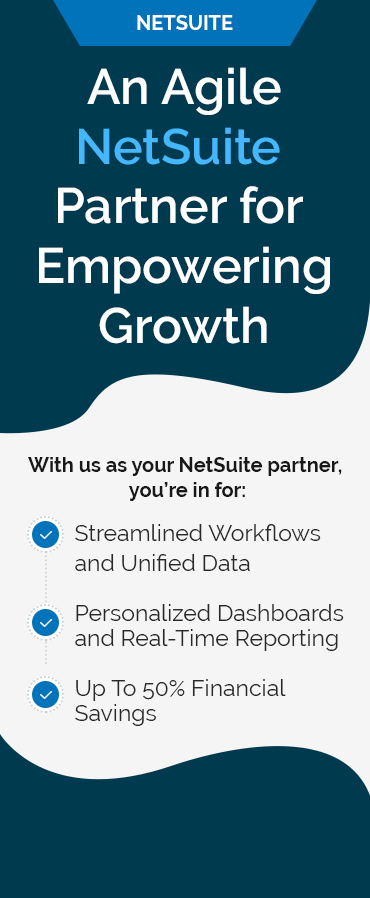Today, the key to successfully serving your customer base is to customize your products/offerings as per their needs.
There is no one-size-fits-all when it comes to what your customers/end-users want or how they use your product. It’s at that point that giving them the freedom to customize products makes perfect sense.
In light of this, think of an ERP system like NetSuite ERP. Now, wouldn’t it be great to customize it and have only the features you and your team want?
After all, each business has its own unique business processes, so it may be necessary to enhance the out-of-the-box system to meet its requirements.
Why Should NetSuite Customization be on Your Checklist?
NetSuite is a powerful ERP system on its own, but when customized to meet your unique needs, it becomes even more powerful.
The customization capabilities of NetSuite help companies at their growth stage and give them the confidence to scale. When it comes to customization, here’s what you can do with NetSuite:
- Configure NetSuite to meet your specific business requirements
- Build new functionality, workflows, and processes your business demands
- Connect to legacy and third-party applications and content providers
- Personalize roles for optimal individual and team efficiency
- Automate approvals and purchasing decisions
- Eliminate manual data entry
- Get a unified view of inter-country transactions
- Get complete visibility of separate legal entities and parent company
Regardless of how appealing these benefits sound, the key to successfully customizing NetSuite is using some best practices.
But first, let’s have a look at some of the most common customizations with NetSuite.
The Most Common Customizations Within Netsuite
Customizing NetSuite can be as simple as adding a custom field or as complex as building a completely new application. Some common customizations include:
(1) Custom fields: Track business-specific data, like customer IDs and product SKUs, with custom fields.
(2) Record types: Create different types of records for storing different kinds of information, including employee, vendor, and customer records.
(3) Workflows: Create workflows that automate business processes by triggering actions based on certain conditions, such as when an order is placed.
(4) SuiteScripts: Implement custom business logic and data objects for automating scheduled processes, running map/reduce queries, and customizing workflow actions.
(5) Reports and Dashboards: Track key metrics and performance indicators through reports and dashboards.
After knowing what could be customized, let’s look at best practices for successful customization.
6 Best Practices for NetSuite Customization

Take a look at the best practices for Netsuite customization to make sure you are getting the maximum benefit from NetSuite investment.
1. Customize During Implementation
As a best practice, you should complete all/most of your customizations and integrations during the implementation process. You must develop custom objects, processes, scripts, integrations, and functionality while everyone gets acclimated to the new system.
Bonus tip: Discover more about best practices on NetSuite implementation here.
2. Optimize Custom Fields and Custom Forms
- To ensure consistency throughout your organization, make sure you document and use proper naming conventions at all times.
- Ensure that you choose the correct field type when creating custom fields.
- Use CSV import, mass update, scheduled scripts, map/reduce scripts, or the CSV import feature during off-peak hours if you need to set up ongoing updates.
3. Utilize Existing Standard Features and Plan Ahead
- It is important to decide if the new customization solution is absolutely necessary, if it is nice to have or if it should be implemented in the future.
- Prepare a roll-out plan and conduct an impact analysis before implementing your solution.
- In order to prevent production account problems, prototype in a sandbox account once your plan is complete.
4. Set Up Internal Controls
- Make sure that logical access and application security are in place. Ensure users only access the information they need to do their jobs.
- Separate duties from transaction processing.
- Regularly audit permissions for each role and limit the number of administrators.
5. Know When to Use SuiteFlow and SuiteScript
Understanding SuiteFlow:
- The SuiteFlow application automates business processes without requiring prior programming experience.
- Prior to developing your SuiteFlow workflow, you should have clarity on you want to achieve.
Understanding SuiteScript:
- SuiteScript is a JavaScript-based API that extends NetSuite’s capabilities. SuiteScript requires programming knowledge.
- With SuiteScript, you can customize user interfaces, run saved searches programmatically, create custom dashboard portlets, run batch processes, and more.
6. Create Conventions for Naming Custom Objects
- Specify a unique alphanumeric identifier when you create a custom object, such as an individual field, a custom record, a custom list, and so forth.
- Identify the correct object to use by naming your customizations according to naming conventions.
- Make sure your custom objects have relevant IDs.
For more insights, watch our exclusive webinar – Best Practices for NetSuite customization.
The Bottom Line
NetSuite customization can help you realize the full potential of this ERP powerhouse. However, when considering customizations for your NetSuite instance, we recommend working with an experienced partner. This way, you will ensure that your business needs are perfectly met and the process is smooth and efficient.
Interested in Learning More about NetSuite? Talk to Us!
And if you would you like to enhance the capabilities of your NetSuite instance, write to us at [email protected] and we will take it from there.












